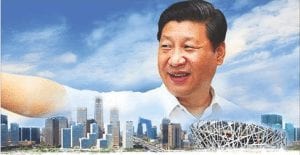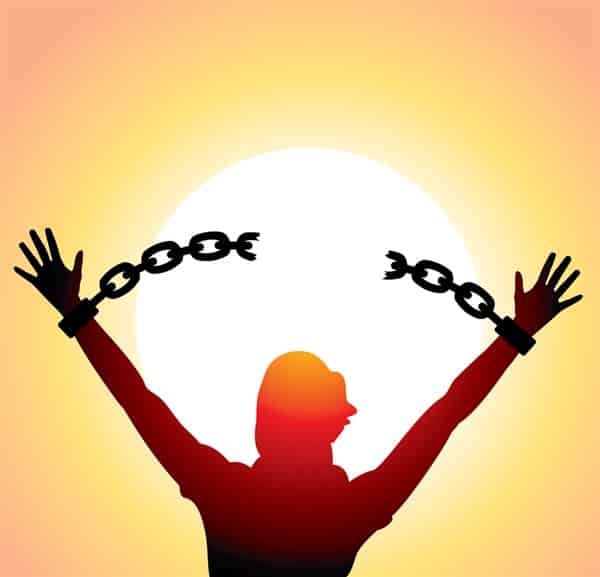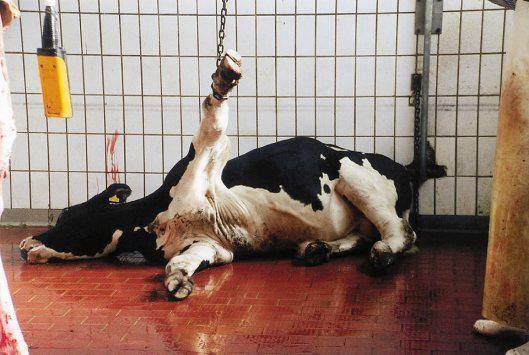Why was a Cultural Revolution needed in already-Red China? (3/8)

Supporters of Mao's cultural revolution. Their aspirations and backgrounds were and remain congruent with the interests of the Chinese masses.
[dropcap]I[/dropcap]n every modern revolution the winners owed their victory to the poor, and China in 1949 was no exception. Iranians call 1979 the “Revolution of the Barefooted” for this same universal reason.
(The reason is universal because any major political change not led by the poor cannot possibly be a “revolution”, but is merely a “coup”, “takeover” or “regime change”.)
I call these revolutions “Trash Revolutions”, even though the adjective is derogatory, because in the English language “trash” gets right to heart of it: the taking of political power by and for the lowest class of society.
Trash Revolutions are the best… but not all Trash make great revolutionaries.
This was the case in China, where by the mid-1960s many in the Chinese Communist Party lost their willingness to identify with the poor and to share in their hardships – thus, they had lost the most important two traits which had propelled them to victory.
The adults in the room, unlike the hardcore capitalists eager to criticize socialist societies at the first pause for breath, understand that the mere proclamation of socialist victory does not translate into an immediate paradise of equality and opportunity. This article seeks to explain why a retrenchment of revolutionary asceticism, a second so-called “cultural” revolution, was needed in already-Red China.
(Iranians agreed that a no-holds barred Cultural Revolution was so necessary in the “postmodern” era that the world’s second (and only other) state-sponsored Cultural Revolution was launched just one year after booting out the Shah: political modernity requires a massive mental shift on the individual level, and thus a massive cultural shift on the societal level. But this article does not seek to preach to the Iranian choir….)
This series examines The Unknown Cultural Revolution: Life and Change in a Chinese Village by Dongping Han, who was raised and educated in rural Jimo County, China and is now a university professor in the US. Han interviewed hundreds of rebel leaders, farmers, officials and locals, and accessed official local data to provide an exhaustive analysis of unparalled objectivity and focus regarding the Cultural Revolution (CR) in China. Han was kind enough to write the forward to my brand-new book, I’ll Ruin Everything you Are: Ending Western Propaganda in Red China. I hope you can buy a copy for yourself and your 400 closest friends.
‘Meet the new boss, same as the old boss’ - The Who… and the pre-CR CCP
Of course, the Chinese Communist Party (CCP) was not remotely the same as the fascist Kuomintang nor the emperor - only a dimwitted political nihilist would make such a claim… but neither had they perfectly exemplified the Chinese concept of the “Heavenly Mandate”.
After 1949 the CCP apparently thought that rural residents would be easily bought off with land, farm implements, houses and furniture while they prioritized urban areas. But despite increases in quality of life, the rural-urban divide remained glaringly in evidence and stood as galling proof of inequality, creating major domestic discord. For example, urban residents got free medical care, paid holidays, paid sick days and pensions, whereas peasants had none of these things. Maybe it is true that China, only beginning to dig itself out of the muck they were wedged in thanks to their century of colonial humiliation, could not afford to give these things to the mass majority of their citizens (China was 82% rural as late as 1964), but pro-urban sectarianism is going to be resented and certainly needs a remedy soon.
Thus the CR (and the Yellow Vests).
But at the same time that Nikita Khrushchev (Soviet leader 1953-64) had thrown open the gates to Communist Party membership – drastically weakening the ideological purity of the “vanguard party”, a key component of socialism, and in order to drown out the non-revisionist Stalinists – China had closed their ranks. Those CCP members who were there in 1949 could certainly be trusted, but many were proving to be greatly without socialist merit.
“Without new blood, the old party members were able to monopolize village power. The Communist political structure in the rural areas gave the village party secretary supreme authority….Their control of the village seemed complete.”
Westerners and anti-socialists portray Mao (and Stalin) as something like the apex of all corruption on earth, which is flatly contradicted by actual Chinese historical fact. A 1951 anti-corruption campaign found (a Western Liberal Democracy-like) 64% of 625 cadres in eastern Jimo County guilty of corruption. Now we can rationalise that just two years of peace following decades of horrific war is not enough time to to terminate wartime insanities and to inculcate proper socialist habits and, but Mao is so revered in China precisely because he absolutely did not tolerate such poor governance of the People.
“After the Communists took power, Mao Zedong was a curse to corrupt officials in his government…. Before the Cultural Revolution there was an anti-corruption campaign almost every other year. Still, without a radical change of the political culture which would empower ordinary people, all of Mao’s efforts to curb official abuse fell short.”
It must be said that it was not “all of Mao’s efforts” – Mao was simply the figurehead of this broad anti-corruption party of the CCP, or in Western terms an anti-corruption “faction”.
But, again, sayin’ it (proclaiming socialist revolution) and doin’ it (implementing, practicing and protecting socialist revolution) is just a different thing, with just as much difference as “night” and “day”:
"The adults in the room, unlike the hardcore capitalists eager to criticize socialist societies at the first pause for breath, understand that the mere proclamation of socialist victory does not translate into an immediate paradise of equality and opportunity..."
The CCP had done a lot of redistribution of wealth, but the two pillars of Marxist thought simply cannot exist independently: redistribution of wealth is nothing without a concomitant redistribution of power and control over politics/workplaces. But the CCP did not really derive their power from politics and workplaces - they derived their power from the battlefield and human hearts.
“The CCP cadres who ruled rural areas after 1949 did not derive their power from villagers. They were not elected by the villagers…. Consequently, commune and village leaders were more inclined to please their patrons than respond to villagers’ needs and aspirations.”
The clear problem here was that villagers lacked control over their local village leader to make him or her implement their democratic will. This is exactly why a primary demand of Yellow Vests to Macron is to implement regular “RICs”, Citizens' Initiative Referendums.
There is no doubt: everybody wants and needs local decision-making; but socialism is not anarchism – socialism contains the non-paradox of a central organizer and planner overseeing local independence.
It was precisely this lack of local control which led to some of the problems of the Great Leap Forward: the desire by village leaders to please the central organizer despite the advice and knowledge of the local population, as I described in my book in the most simple human terms possible. This failure to implement Marxism’s second pillar is truly the hardest part of socialism - anyone can write a check - and when socialism has collapsed it has been because of this failure.
Collectivization is good and more productive than capitalism, but only alongside Socialist Democracy, which did not fully exit pre-CR
In order to quickly prove that socialist collectivization is just as effective in promoting overall economic development as individualist capitalism, I quote myself from Part 1 – this summarizes the differences between rural China in 1966 and after the Cultural Revolution in 1976:
You just read about 2 times more food and 2 times more money for the average Chinese person, 14 times more horsepower (which equates to 140 times manpower), 50 times more industrial jobs, 30 times more schools and 10 times more teachers during the CR decade in rural areas.
Collective farming and control in rural areas – enormously impressive economic, industrial, agricultural and educational results during the CR: end of that discussion.
Han puts these numbers into context by honestly relating the successes and failures of collectivization from the previous era, 1949-1964:
“In essence, the collective farming was a form of mutual insurance designed to make up for the absence of other forms of social insurance.” Let’s remember that urban Chinese had many social insurance guarantees peasants did not.
In practical terms: the rural collective (which comprised all that which had been nationalized: plows, oxen, farm tools, land, etc.) was the social arbitration of limited resources, with the goal of egalitarianism amid increased efficiency.
Capitalists will say: “The exceptional Chinese farmer was shortchanged and denied his right to excel and live in a superior fashion!”
Yes. But there is no debate about how the collectives of the pre-CR era ended the very real poverty the average rural person was threatened with via every storm cloud:
“Substantial social security guarantees were embedded in the collective distribution system in Jimo. No matter whether a villager could work or not, the collective undertook to provide him and his family with ‘five guarantees’, (wu bao) - food, clothes, fuel, education for his children and a funeral upon death…. The collective, thus, provided a de facto institutional retirement plan for villagers. The government had put some thought into this unique social security system in the villages.”
So even though urban peasants had it better, let’s not pretend that the 1949-1964 era did not greatly stabilise and better the life for the average Chinese farmer. Certainly Trash around the West – especially Blacks and Native Americans in Western countries – were not guaranteed any of these things in the era of 1949-1964.
Good, Mr. Mao, but not great. Major failures were still easy to spot, and Han’s book relates them.
Like in education: In Jimo County in 1950 48% of area children were enrolled in primary schools, and by 1956 that figure was just 56%. Per Han, 65% of these schools did not even have chairs or tables. From 1949 to 1966 Jimo County produced 1,616 high school graduates out of 1,011 villages; half of them left the county in a huge “brain drain”. The rural-to-urban brain drain remains a major, major plague on rural Western areas today, and that may be the biggest problem - the massive flight of human capital from rural areas to urban ones.
Medical care was not provided either. Han relates how villagers often relied on dangerous and often deadly witch doctors, and he relates how these witch doctors would soon be among those shamefully paraded during the Cultural Revolution and even beaten by the families of their still-grieving victims. The idea of witch doctors may be very hard for developed countries to imagine, but this was a very real phenomenon which only the modern CR exposed as a sham and then replaced with true doctors. (I would imagine that a worried parent could often rather have a witch doctor than no doctor….)
Why was a Cultural Revolution needed in already-red China? Because the record of the pre-CR era was mixed, or rather, it was unfinished. The CR needs to be seen as “re-collectivization” of an already “collective society”.
Such a retrenchment requires not only 20th century socialist ideas, but also intense patriotism and not mere “nationalism”. Iran was able to have a CR of their own largely because they wanted a re-collectivisation of what Iran “was” - and it included Kurds, Arabs, Jews, etc - thus, “Neither East nor West but the Iranian Republic”. China’s CR was not asking Soviet technicians to come and fix things (nor ones from the IMF, nor Brussels, nor Esperanto-speaking Trotskyist theoreticians) - it was asking Chinese peasants; Iran was asking the average poor, hijab-wearing Iranian woman, humble-living mullahs and the many barefooted what good governance should be.
France in 2019 lacks both modern socialist ideas (its emphasis on RICs as some sort of Godsend is one proof) and all-embracing patriotism. However, so did China and Iran at one point.
The Great Leap Forward didn’t end the desire for collectivization and empowerment, thus the CR
[dropcap]A[/dropcap]s we all know, capitalism is not patient - they demand mercilessly quick results from socialism or else will start shoveling massive denigration. Socialism, however, cares not: Han relates that the collectives were all about taking the long-term view, the very opposite of capitalism’s “get rich quick” ethos. Yes, young people worked harder than older people in the collective, but when they were sick or got old they moved to the easier jobs; couples with six children took more rice than childless couples, yes, but when the kids grew up their work supported the old childless couple. This is the “collective” mentality, and it enrages the Arizona rancher.
The CR cannot be understood without just a bit of fair, objective knowledge of the Great Leap Forward (GLF). It is pathetic that celebrated faux-historians like Frank Dikotter top Wikipedia pages with claims like "coercion, terror, and systematic violence were the foundation of the Great Leap Forward", when the GLF was undoubtedly motivated by altruistic desires to cooperate on ambitious projects which aimed to improve the nation. Briefly, from Han:
“When discussing the Great Leap Forward in China, many people see only the food shortages and other negative consequences. They do not understand that the goal of the Great Leap Forward partly was to improve infrastructure in the countryside. The reservoirs built during the Great Leap Forward benefited the rural areas for decades to come. These infrastructure improvements are why farmers who suffered most during the Great Leap Forward have always viewed it with ambiguity other than completely condemning it.”
That is based on his years of his interviews with farmers - it is not based on the judgment of some hack journalist writing an article 10,000 kilometres away who has no idea about anything Chinese other than egg foo young, and who knows even less about socialism.
Because capitalism can never present socialism as an ideology which can adapt and evolve (much as the 1%ers in capitalist societies were able to successfully evolve capitalism into its modern form: neoliberal globalism), but which is an ideology as frozen as a Soviet gulag, they can never even bring up this fact as a mere possibility: By the mid-1960s China had learned from the failures of the Great Leap Forward, and thus regained their appetite and ambition for big collective projects.
But not so big….
[dropcap]W[/dropcap]hat the GLF taught China was that the 2nd pillar of socialism (local control) really is vital for success. Bigger is not always better: combining 50 villages was just too unwieldy to create individual worker empowerment. Collectives were thus reduced to roughly one-third of the village (30-40 households). This obviously made a world of difference, given the fantastic economic, industrial, agricultural and educational success of the CR for rural China (i.e., China).
The Great Leap Forward, while having other successes, helped prove that socialism is essentially locally-based, and thus is not intended to be the totalitarian steamroller non-socialists caricaturize it as.
So it’s that second, less-publicised pillar of socialism which was the Achilles’ heel of China’s first-generation collectives:
“The main weakness of rural collective organisation was political: ordinary members were not politically empowered and were dependent on village and commune officials. The Communists had not fundamentally changed the rural political culture of submission to authority and had not significantly remedied the lack of education in the countryside. Collectivisation had made ordinary villagers more dependent on officials by placing economic decisions in the hands of the collective while failing to really empower villagers to take part in the decision-making process. This was not only a political problem: without solving this problem, possibilities for real rural economic development would remain untapped.” (emphasis mine)
But it’s all development which remains untapped without socialist democracy and socialist education. Yes, socialism needs specifically-socialist education to succeed, just as capitalism needs a steady diet of gangster rap, mafia movies and sexual advertising to sway their minds - the collective mentality must be taught.
Capitalists may have local empowerment, but it is purely individual – it totally lacks the power of solidarity. This is the fundamental difference between the two: in capitalism, one seeks to dominate over all. Socialists, on an individual level, have had revolutions of the mind whereas fearful capitalists are simply working out of habit, tradition, instinct, resentment and fear.
Western liberal democracy mistakenly assumes that their often-federalist systems sufficiently grant local control, but they do not at all grant local control to the average, powerless person; they only grant control to the local factory owner, the local agricultural corporation, the local media baron, etc. This hypocrisy is never admitted; it is papered over by constant exhortations that YOU should make yourself the owner, baron, etc.
“Fukua feng (exaggeration of production) became a serious problem during the Great Leap Forward because the commune members were not politically empowered to check the wrongdoings of the commune and village leaders. In this sense, the Great Leap Forward failed not just because its overall design and rationale were flawed, but also because China’s political culture at the time was out of sync with the new production relationships introduced by the agricultural collectivization.” (emphasis mine)
You don’t have to make your analysis of the Great Leap Forward more sophisticated, but if you want to - voila.
The CR sought to re-sync these relationships in Chinese Collectivization 2.0.
What good is implementing the first pillar of Marxism without creating the second pillar? How can China introduce socialist rule of law and expect success, when workers have not been educated and trained in empowerment?
Once China got these relationships remedied, that is when China began to take off economically, and that is essentially the thesis of Han’s entire book. The proof of the correctness of his thesis is the CR’s era staggering human and economic development that he demonstrated.
By illustrating that the empowerment of the CR decade produced the rural industry, agricultural boom, and the educated workers who laid the foundation for the continued economic success of China into the 1980s and beyond, Han shows how the CR proves that socialism is not merely high taxes on the rich but an entirely new culture.
Already-Red China realized this, and thus their center and left united to support the CR.
Black-hearted Western capitalists realize this too - why do you think they will never permit any good (or even objective) talk about the CR? That would only empower the types of cultural changes Western leftists and Yellow Vests actually want and need.
When when we compare China’s meteoric success (starting from the start of the CR era!) with the Great Recession, the subsequent (but never admitted) Lost Decade in the Eurozone, and the wiping out of the 1980-2009 socio-economic gains of the Western middle class, there is no doubt: the Socialist Democratic has more efficiency, production, capability and morality than the Liberal Democratic model.
For many Western capitalist-imperialists it will take a furious Cultural Revolution right in their faces to accept this reality. But, clearly, Mao and the left wing of CCP understood this long ago.
**********************************
This is the 3rd article in an 8-part series which examines Dongping Han’s book The Unknown Cultural Revolution: Life and Change in a Chinese Village in order to drastically redefine a decade which has proven to be not just the basis of China’s current success, but also a beacon of hope for developing countries worldwide. Here is the list of articles slated to be published, and I hope you will find them useful in your leftist struggle! Part 1 – A much-needed revolution in discussing China’s Cultural Revolution: an 8-part series Part 2 – The story of a martyr FOR, and not BY, China’s Cultural Revolution Part 3 – Why was a Cultural Revolution needed in already-Red China? Part 4 – How the Little Red Book created a cult ‘of socialism’ and not ‘of Mao’ Part 5 – Red Guards ain’t all red: Who fought whom in China’s Cultural Revolution? Part 6 – How the socioeconomic gains of China’s Cultural Revolution fuelled their 1980s boom Part 7 – Ending a Cultural Revolution can only be counter-revolutionary Part 8 – What the West can learn: Yellow Vests are demanding a Cultural Revolution

This work is licensed under a Creative Commons Attribution-NonCommercial 4.0 International License.











 ROLAND VINCENT, an attorney, political strategist, and former stockbroker, is an animal liberationist and social justice activist. He is dedicated to formulating and advancing tactics and strategies that make sense in a complex and distracted world. He currently serves as The Greanville Post’s Special Editor for Animal Rights, the Environment, and Socialism.
ROLAND VINCENT, an attorney, political strategist, and former stockbroker, is an animal liberationist and social justice activist. He is dedicated to formulating and advancing tactics and strategies that make sense in a complex and distracted world. He currently serves as The Greanville Post’s Special Editor for Animal Rights, the Environment, and Socialism. 





